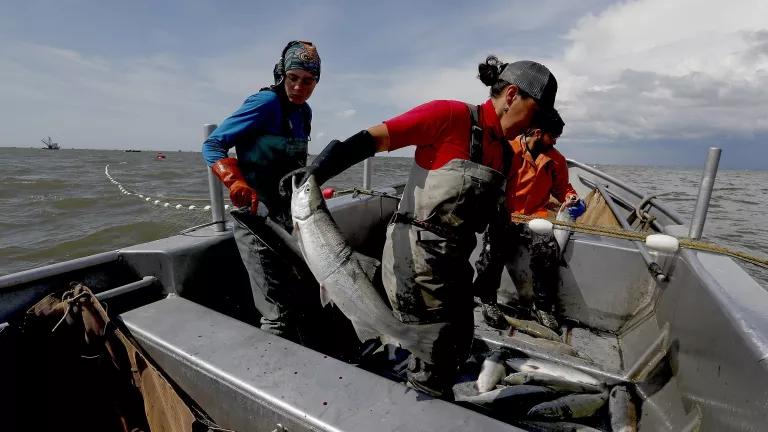Pebble Mine Submits Secret Mitigation Plan
The proponents of the proposed Pebble Mine in Bristol Bay, Alaska promise that they can mitigate the project’s destruction of thousands of acres of pristine wetlands and more than one hundred miles of streams – but they refuse to say how.

Refuses to Release It to the Public
The proponents of the proposed Pebble Mine in Bristol Bay, Alaska promise that they can mitigate the project’s destruction of thousands of acres of pristine wetlands and more than one hundred miles of streams—but they refuse to say how.
Shrouding their plan in secrecy is an outrageous affront to the Tribes and commercial fishermen of Bristol Bay, who have long opposed the Pebble Mine because it poses too great a threat to the ecosystem—and the lives, culture, and $1.5 billion annual commercial fishing industry that depend on its pristine waters and legendary salmon runs.
It’s also an affront to an already beleaguered permitting process, plagued by the U.S. Army Corps of Engineers’ inexplicably hasty and woefully deficient review of the proposed mine. It’s repugnant hat the Army Corps is now refusing to publicly release Pebble’s mitigation plan—particularly after already conducting a permit review process that skirts its legal obligations and ignores the voices of Bristol Bay’s indigenous peoples and Tribes, cooperating state and federal agencies, and independent scientists who have raised serious concerns.
This is just the latest shocking twist in a soap opera-worthy saga.
Pebble submitted this mitigation plan only after the Army Corps issued a strongly worded statement last August that the project “cannot be permitted” as proposed without substantial mitigation. Pebble originally proposed a compensatory mitigation plan that was laughable. To mitigate the permanent loss of thousands of acres of wetlands, Pebble had previously proposed only three small mitigation projects that would provide minimal environmental benefits: (1) improving municipal wastewater treatment systems in three small villages (less than 700 people total); (2) upgrading a handful of existing fish culverts; and (3) cleaning up marine debris at the old port site. That mitigation would, at best, provide marginal environmental benefit compared to the massive, harmful impacts associated with mine development.
In a letter to Pebble, the Army Corps found that the mine—as proposed—would inflict “unavoidable adverse impacts” and lead to “significant degradation” of water and marine life. The Corps determined that “in-kind compensatory mitigation within the Koktuli River Watershed will be required to compensate for all direct and indirect impacts caused by discharges into aquatic resources at the mine site” and gave Pebble ninety days to revise its compensatory mitigation plan.
Then in September a bombshell dropped: release of the now famous Pebble Tapes. The videotapes, secretly recorded by the DC-based Environmental Investigation Agency posing as Chinese investors, show Pebble’s CEOs demeaning government officials, boasting about their political manipulation, and confirming their actual long-term plan: to build a 200-year operation that would eventually mine the entire 10 billion ton ore body rather than the smaller 1.5 billion, 20-year mine currently proposed. In other words, the smaller mine is just a gambit to improve their chances of getting a permit.
Among many other embarrassing revelations, the Pebble CEOs also bragged about their cozy relationship with the Army Corps and that the State of Alaska would subsidize $1.5 billion in infrastructure costs to help the foreign mining company.
The fallout was fast and furious.
Within days, Pebble CEO Tom Collier resigned in disgrace. And after years of noncommittal fence-sitting, Alaska’s Republican Senators Lisa Murkowski and Dan Sullivan finally came out on record against the mine.
Despite the fallout—and clear evidence straight from the horse’s mouth confirming Pebble’s deceptiveness and undue influence over the permitting process—the Army Corps has steadfastly refused to put the brakes on permitting.
As the Tribal and business leaders of Bristol Bay implored the Corps: “Given the revelations in the Pebble Tapes and our collective experiences in the permitting process, we have no confidence in the Alaska District’s ability to make a fair, objective, and science-based decision on this permit.” The groups asked Army Corps to deny Pebble’s permit, or at a minimum provide a public comment period on Pebble’s revised mitigation plan. “Not to take action is to further the mental stress, physical harm and distractions, and economic opportunity cost that [Pebble] has inflicted on Bristol Bay for well over a decade,” the groups wrote.
Yet the Corps did nothing. Which brings us back to Pebble’s compensatory mitigation plan.
Pebble submitted its revised plan with two days to spare. The catch: neither Pebble nor the Army Corps will release that plan to the public.
Nor will the Army Corps allow the public an opportunity to comment on the plan, despite repeated requests to do so from the Tribal and business leaders of Bristol Bay, commercial fishermen, and NRDC.
Even the Environmental Protection Agency urged the Corps to provide notice and public comment. "The Corps should provide an opportunity for meaningful public comment on a CMP [compensatory mitigation plan] that includes a level of detail 'commensurate with the scope and scale of the impacts' as well as the 'amount, type, and location' of compensation they could potentially provide," EPA wrote in a letter to the Corps.
Instead, the Army Corps’ summarily denied our requests for notice and a public comment period. Its denial is inexplicable given that it allowed a 30-day public comment period on the compensatory mitigation plan filed by proponents of the Donlin gold mine in Alaska—a mine that is a fraction of the size and potential impacts as Pebble.
Pebble’s compensatory mitigation plan will have to offset damage caused by the permanent destruction of thousands of acres of pristine wetlands at the headwaters of Bristol Bay. Spoiler alert: that’s impossible. You cannot remediate what is already pristine.
Bristol Bay is home to the world’s largest wild sockeye salmon fishery, providing 14,000 jobs, supporting a $1.5 billion annual commercial fishery, and supplying half of the world’s sockeye salmon. Salmon are the pillar of the Bristol Bay economy, supporting not only the commercial fishery but also sports and subsistence fishing, hunting, recreation, and tourism. Bristol Bay's wild salmon have also sustained Alaska Natives for more than 4,000 years, and are the lifeblood of their language, culture, spirituality and community.
Given the risks, it is no surprise that more than 80 percent of Bristol Bay residents—and 62 percent of Alaskans—oppose the project.
For them, Pebble Mine will always be the wrong mine in the wrong place.
President-elect Biden has vowed to block the project.
Bristol Bay has been foundational to the way of life of Alaska Natives for countless generations, provides incredible joy for recreational anglers from across the country, and is an economic powerhouse that supplies half of the world’s wild sockeye salmon. It is no place for a mine. The Obama-Biden Administration reached that conclusion when we ran a rigorous, science-based process in 2014, and it is still true today. . . As President, I will do what President Trump has failed to do: listen to the scientists and experts to protect Bristol Bay—and all it offers to Alaska, our country, and the world.
Bristol Bay needs that leadership now more than ever.
The Army Corps has more than enough reasons to deny the permit—and it should.
But a permit denial—which is not guaranteed given the Corps’ abject track record and chumminess with Pebble—will not protect the people and economy of Bristol Bay over the long term. A permit denial will leave the door open for future mining in Bristol Bay under more politically favorable circumstances.
The incoming Biden administration should therefore use EPA’s authority under Section 404(c) of the Clean Water Act to permanently protect Bristol Bay from the Pebble Mine. The Biden Administration can and should ensure that Bristol Bay, Alaska is protected for generations to come.



